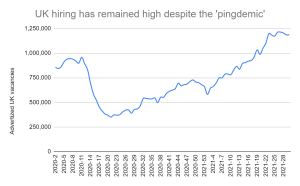The single biggest challenge for the U.S. jobs market is improving confidence among workers and tempting more Americans back to work. At the moment, the labor market is tipped heavily in the favor of job-seekers, with millions of open roles and not enough people to fill them. Hiring has surged as the economy continues to reopen, with especially growing opportunities in boom sectors like tech, logistics, and construction, and food services. But there remains a shortage of people to fill these vacancies, with long-term unemployment at an elevated level, currently 5.9%.

There are a host of reasons behind this, but much of the reticence preventing many Americans from returning to work comes down to concerns around Covid-19, particularly the spread of the Delta variant.
This is significant. The Federal Reserve has warned nearly 9 million Americans may be holding back from returning to the labor market due to hesitations about Covid, specifically the Delta variant.
Lessons From the U.K.
When it comes to Delta, there are some lessons to learn from other countries. Take the U.K., for example. There are a few interesting contrasts worth noting. First, vaccination uptake is lower in the U.S. than in the U.K. — 70.2% of US adults have received at least one dose of the vaccine, while 60.7% are fully vaccinated. By comparison, 88.7% of U.K. adults have received at least one jab, and 73% are fully vaccinated.
Another key contrast is that the U.S. has been far more varied in terms of uptake. While vaccination rates are high in states including California, New York, New Hampshire, Washington, and New Mexico, other states, including Wyoming, Mississippi, and Alabama are seeing notably lower uptake.
There is also a correlation in the U.S. between lower vaccination rates and areas with more blue-collar jobs in fields like warehousing, construction, and driving. Meanwhile, metro areas with high vaccination rates tend to have more jobs that can be done from home, while areas with more jobs requiring in-person work tend towards lower vaccination rates.
This could threaten to make a tough hiring environment even harder, with many blue-collar industries already struggling to fill open vacancies. Our data shows over 989,000 advertised logistics and warehousing job vacancies in July 2021, up 169% year-on-year. Trade and construction jobs increased 93% over the same period to just under 115,000 openings, while manufacturing hiring rose 206% to over 123,000 openings. If the Delta variant continues to increase, these lower-vaccine-uptake areas could continue to struggle to fill roles as other areas reap the benefits of more job-seekers hitting the market.
Building Back Job-Seeker Confidence
What other impact could the variant have? In the U.K., where regular testing is the norm, surging Delta cases created a “pingdemic” in which workers who had been exposed to Covid were self-isolating in their droves, leading to staffing issues for many sectors, particularly retail, hospitality, food services, and the wedding industry.

In the U.S., where Delta cases are still on the rise, the variant threatens to delay school openings, which could make it harder for working parents to rejoin the labor market in hard hit areas. Again, areas with lower vaccination rates are most exposed.
But the biggest impact of the Delta variant on the jobs market is the effect on confidence. Job vacancies on the front line in particular, such as servers in bars and restaurants or workers in essential food shops, may be harder to fill if workers become more cautious around Covid-19. Similarly, office workers want more clarity on return-to-office policies and assurances that any transition back to office life is safe.
As a result, some companies are making proof of vaccination mandatory. Facebook, Uber, Netflix, and Google have all said they will require proof of vaccination for workers returning to the office. Others, including Lyft and Asana, have chosen to push back return-to-office schedules into 2022.
A Bump in the Road to Recovery
Despite the threat of the Delta variant, we can expect to see a rebalancing of the labor market this fall. We’re already seeing positive signs of growth in job-seekers flooding back to the market in the U.S. If what we’ve seen in the U.K. over recent weeks is anything to go by, Delta is just a bump in the road of the labor market recovery and it shouldn’t cause any significant setbacks.
